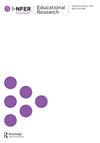Quiet in class? Exploring discourses on verbal participation
IF 2.6
3区 教育学
Q1 EDUCATION & EDUCATIONAL RESEARCH
引用次数: 0
Abstract
ABSTRACT Background Verbal participation in the classroom is generally considered to contribute to positive student engagement and learning outcomes. Students are often required to demonstrate their learning in class by, for example, raising their hands and answering questions. However, there are students who remain quiet in the classroom, and are not responsive to invitations to participate. As quietness and low levels of verbal participation in class are often perceived and positioned as problematic in many educational systems and settings, more needs to be understood about the notion of students’ verbal participation and the implications for supporting all students’ learning journeys through school. Purpose The study sought to explore how students’ verbal participation was constructed and positioned in the narratives of parent-teacher conferences. Method A Swedish corpus of audio recordings and transcriptions of parent-teacher conferences with 24 students in years 5 and 6 (approximate student ages 10–12) across five schools was utilised as the basis for the investigation. Through an interactionally-oriented narrative approach, a collection of stories about verbal participation was identified. These stories were analysed using the concept of narrative positioning. Three stories from the collection were selected to demonstrate, in greater depth, aspects of how students’ verbal participation was constructed and how discourses unfolded. Findings The analysis demonstrated diversity in terms of how discourses were employed and how students were positioned in the narratives about verbal participation. Prevalent discourses drew on notions of learning, affect and assessment and were identified as pedagogical, psychological and performative discourses. Conclusions The study highlights how verbal participation tends to be constructed as an individual undertaking, with the implication being that students are assigned individual responsibility for this. As students are usually encouraged to make the most of their verbal participation in class, the study gives rise to important and complex questions in terms of challenging assumptions about how best to support student learning, particularly in the case of students who remain quiet in the classroom.上课安静吗?言语参与话语探究
摘要背景课堂上的口头参与通常被认为有助于积极的学生参与和学习成果。学生们经常被要求在课堂上通过举手和回答问题来展示他们的学习。然而,有些学生在教室里保持安静,对参与的邀请没有反应。由于在许多教育系统和环境中,课堂上的安静和低水平的口头参与经常被认为是有问题的,因此需要更多地了解学生口头参与的概念及其对支持所有学生通过学校学习之旅的影响。目的本研究旨在探讨学生的口头参与是如何建构和定位在家长教师会议的叙述。方法采用瑞典语料库,收集了五所学校的24名五年级和六年级学生(大约10-12岁的学生)家长会的录音和抄本,作为调查的基础。通过以互动为导向的叙事方法,确定了一系列关于口头参与的故事。运用叙事定位的概念对这些故事进行分析。从选集中选出三个故事,更深入地展示学生的口头参与是如何构建的,以及话语是如何展开的。分析表明,在话语的使用方式和学生在言语参与叙事中的定位方面存在多样性。流行的话语借鉴了学习、影响和评估的概念,并被确定为教学、心理和表演话语。该研究强调了口头参与是如何被构建为一项个人任务的,这意味着学生被赋予了个人责任。由于学生通常被鼓励在课堂上充分利用他们的口头参与,这项研究提出了一些重要而复杂的问题,即如何最好地支持学生的学习,特别是在课堂上保持安静的学生的情况下。
本文章由计算机程序翻译,如有差异,请以英文原文为准。
求助全文
约1分钟内获得全文
求助全文
来源期刊

Educational Research
EDUCATION & EDUCATIONAL RESEARCH-
CiteScore
4.00
自引率
2.90%
发文量
0
期刊介绍:
Educational Research, the journal of the National Foundation for Educational Research (NFER), was established in 1958. Drawing upon research projects in universities and research centres worldwide, it is the leading international forum for informed thinking on issues of contemporary concern in education. The journal is of interest to academics, researchers and those people concerned with mediating research findings to policy makers and practitioners. Educational Research has a broad scope and contains research studies, reviews of research, discussion pieces, short reports and book reviews in all areas of the education field.
 求助内容:
求助内容: 应助结果提醒方式:
应助结果提醒方式:


